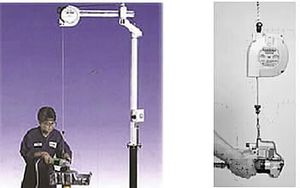Difference between revisions of "Balancers"
m |
|||
| (One intermediate revision by one other user not shown) | |||
| Line 1: | Line 1: | ||
[[Category:Weighing]]{{Knoppen}} | [[Category:Weighing]]{{Knoppen}} | ||
[[File:Balancer.jpg|thumb|right|Balancers]] | |||
'''Balancers''' allow users to not only lift the load but also float the load, allowing for precise manual movement and placement without the jogging required with traditional hoists. Balancers operate within a capacity range of 50 to 2000 lb. | |||
Balancers enhance productivity of light-assembly operations and are available in hundreds of choices ranging from 0.5 to 168 kg capacity. Advances such as high-impact housings, spiral-grooved tapered drums, manual drum locks and replacement spring assemblies ensure long-term performance and value. | |||
A balancer is a device that acts as a reverse proxy and distributes network or application traffic across a number of servers. Balancers are used to increase capacity and reliability of applications. They improve the overall performance of applications by decreasing the burden on servers associated with managing and maintaining application and network sessions, as well as by performing application-specific tasks. | |||
Latest revision as of 19:23, 28 March 2013
Balancers allow users to not only lift the load but also float the load, allowing for precise manual movement and placement without the jogging required with traditional hoists. Balancers operate within a capacity range of 50 to 2000 lb.
Balancers enhance productivity of light-assembly operations and are available in hundreds of choices ranging from 0.5 to 168 kg capacity. Advances such as high-impact housings, spiral-grooved tapered drums, manual drum locks and replacement spring assemblies ensure long-term performance and value.
A balancer is a device that acts as a reverse proxy and distributes network or application traffic across a number of servers. Balancers are used to increase capacity and reliability of applications. They improve the overall performance of applications by decreasing the burden on servers associated with managing and maintaining application and network sessions, as well as by performing application-specific tasks.
